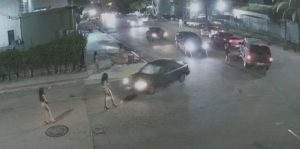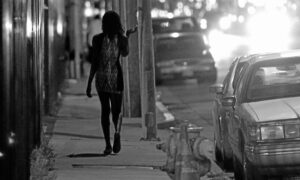Governor Gavin Newsom signed Senate Bill 357 into law in July 2022, repealing a statute that prohibited loitering with the intent to engage in prostitution. It became effective in January of this year. As a result, pimps across the state realized they could expand their prostitution operations with minimal fear of repercussions from law enforcement.
Law enforcement heavily relied on the state’s loitering law as a crucial tool for prosecuting pimps and human traffickers. This law served as the cornerstone for establishing probable cause, enabling investigators to identify victims and remove them from the control of their exploiters.
Now, prostitution has surged as individuals dressed in minimal clothing roam the streets during daylight hours in close proximity to businesses, residences, and educational institutions. Video recordings from both the Bay Area and San Diego depict women parading in g-strings, bras, and high heels, even bending over in the middle of traffic, regardless of the time of day. Residents have been complaining about the disturbances, fights, drug-related activities, and the overall inappropriateness of such conduct in proximity to children.
National City Mayor Ron Morrison described the deeply concerning situation in his city to Fox News. “Those that are out there on the street, most of them are wearing less than what you would consider a scanty negligee. It is just flaunting in everybody’s face. And so a lot of people are screaming, ‘Hey, you know, can’t you get them on indecent exposure?’ And the problem is the way our laws read in this state. The definition of indecent exposure is as long … as the genitals are covered. Anything else is fair game out in public.”
Fox News also reported that sex workers are congregating in a downtown location in National City adjacent to a freeway. The situation has been exacerbated by a recent California law that legalized jaywalking, as some women now risk standing in traffic to solicit customers.
Advocates of SB 357 argued that it was necessary to safeguard racial minorities and those who identify as LGBTQ+ from potential police discrimination and harassment. However, the cons of this bill far outweigh the potential risk of discrimination without it.
San Diego Police Chief David Nisleit complained that the law bolsters the confidence of individuals engaged in human trafficking, particularly involving younger women. He also mentioned that this law significantly complicates their efforts to rescue these victims.
“In the past, you know, when we were able to contact women or those involved in sex trafficking, we could use the ‘loitering with intent’ after we watched them. Once they decriminalize that, we really don’t have an entryway into making that contact anymore…What we’re seeing now, is we have these open sex markets, 24 hours a day, 365 days out of the year,” Nisleit told the Daily Wire.
Some Republicans tried to repeal SB 357 earlier this year. However, their endeavor was not been successful, because of the robust support from Democrat members in the state Senate, as evidenced by their 29-8 vote opposing a repeal effort last March.
California cannot afford laws that empower sex traffickers and diminish the safety of the state’s communities for families.




